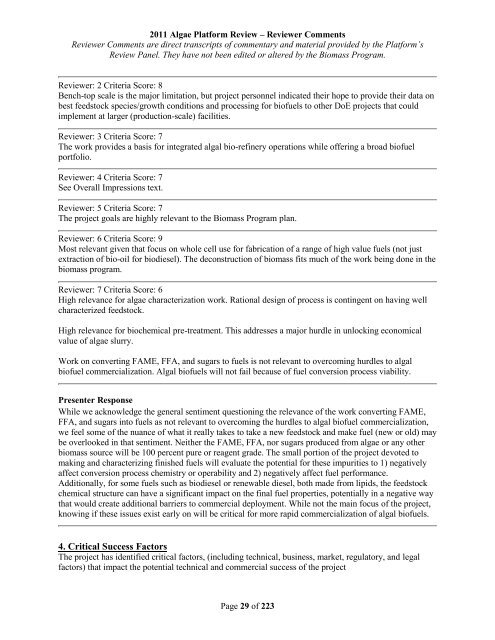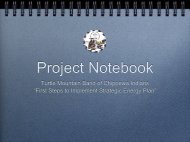Reviewer Comments - EERE
Reviewer Comments - EERE
Reviewer Comments - EERE
Create successful ePaper yourself
Turn your PDF publications into a flip-book with our unique Google optimized e-Paper software.
2011 Algae Platform Review – <strong>Reviewer</strong> <strong>Comments</strong><br />
<strong>Reviewer</strong> <strong>Comments</strong> are direct transcripts of commentary and material provided by the Platform’s<br />
Review Panel. They have not been edited or altered by the Biomass Program.<br />
<strong>Reviewer</strong>: 2 Criteria Score: 8<br />
Bench-top scale is the major limitation, but project personnel indicated their hope to provide their data on<br />
best feedstock species/growth conditions and processing for biofuels to other DoE projects that could<br />
implement at larger (production-scale) facilities.<br />
<strong>Reviewer</strong>: 3 Criteria Score: 7<br />
The work provides a basis for integrated algal bio-refinery operations while offering a broad biofuel<br />
portfolio.<br />
<strong>Reviewer</strong>: 4 Criteria Score: 7<br />
See Overall Impressions text.<br />
<strong>Reviewer</strong>: 5 Criteria Score: 7<br />
The project goals are highly relevant to the Biomass Program plan.<br />
<strong>Reviewer</strong>: 6 Criteria Score: 9<br />
Most relevant given that focus on whole cell use for fabrication of a range of high value fuels (not just<br />
extraction of bio-oil for biodiesel). The deconstruction of biomass fits much of the work being done in the<br />
biomass program.<br />
<strong>Reviewer</strong>: 7 Criteria Score: 6<br />
High relevance for algae characterization work. Rational design of process is contingent on having well<br />
characterized feedstock.<br />
High relevance for biochemical pre-treatment. This addresses a major hurdle in unlocking economical<br />
value of algae slurry.<br />
Work on converting FAME, FFA, and sugars to fuels is not relevant to overcoming hurdles to algal<br />
biofuel commercialization. Algal biofuels will not fail because of fuel conversion process viability.<br />
Presenter Response<br />
While we acknowledge the general sentiment questioning the relevance of the work converting FAME,<br />
FFA, and sugars into fuels as not relevant to overcoming the hurdles to algal biofuel commercialization,<br />
we feel some of the nuance of what it really takes to take a new feedstock and make fuel (new or old) may<br />
be overlooked in that sentiment. Neither the FAME, FFA, nor sugars produced from algae or any other<br />
biomass source will be 100 percent pure or reagent grade. The small portion of the project devoted to<br />
making and characterizing finished fuels will evaluate the potential for these impurities to 1) negatively<br />
affect conversion process chemistry or operability and 2) negatively affect fuel performance.<br />
Additionally, for some fuels such as biodiesel or renewable diesel, both made from lipids, the feedstock<br />
chemical structure can have a significant impact on the final fuel properties, potentially in a negative way<br />
that would create additional barriers to commercial deployment. While not the main focus of the project,<br />
knowing if these issues exist early on will be critical for more rapid commercialization of algal biofuels.<br />
4. Critical Success Factors<br />
The project has identified critical factors, (including technical, business, market, regulatory, and legal<br />
factors) that impact the potential technical and commercial success of the project<br />
Page 29 of 223




